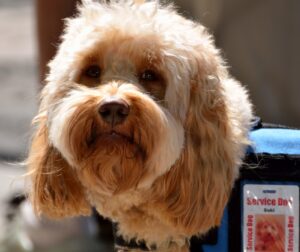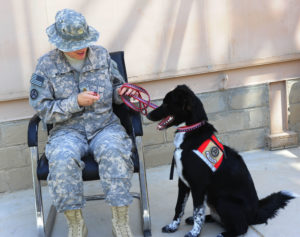Businesses and Service Animals
We have recently had several clients inquire about their rights with respect to the obligation to allow service animals into a public facility such as a restaurant. As a business owner, employee, or other member of the community, there are some important things you should be aware of regarding service animals who have public access rights.
What are my obligations under the Americans with Disabilities Act (“ADA”)?
Under the ADA, State and local governments, businesses, and nonprofit organizations that serve the public generally must allow service animals to accompany people with disabilities in all areas of the facility where the public is normally allowed to go, even if a dog is not typically allowed in that space. For example, in a hospital it would be inappropriate to exclude a service animal from areas such as patient rooms, clinics, cafeterias, or examination rooms. However, it may be appropriate to exclude a service animal from operating rooms or burn units where the animal’s presence may compromise a sterile environment.
What is a service animal?
A service animal is defined as a dog that is individually trained to do work or perform tasks for people  with disabilities. Examples of such work or tasks include guiding people who are blind, alerting people who are deaf, pulling a wheelchair, alerting and protecting a person who is having a seizure, reminding a person with mental illness to take prescribed medications, calming a person with Post Traumatic Stress Disorder (PTSD) during an anxiety attack, or performing other duties. The work or task a dog has been trained to provide must be directly related to the person’s disability. Dogs whose sole function is to provide comfort or emotional support do not qualify as service animals under the ADA. It is important to note that a service animal is not a pet.
with disabilities. Examples of such work or tasks include guiding people who are blind, alerting people who are deaf, pulling a wheelchair, alerting and protecting a person who is having a seizure, reminding a person with mental illness to take prescribed medications, calming a person with Post Traumatic Stress Disorder (PTSD) during an anxiety attack, or performing other duties. The work or task a dog has been trained to provide must be directly related to the person’s disability. Dogs whose sole function is to provide comfort or emotional support do not qualify as service animals under the ADA. It is important to note that a service animal is not a pet.
What are the owner’s obligations?
Both the owner and the service animal have the following responsibilities:
- The service animal must be well behaved and under control, on leash or harness.
- The service animal must be well groomed.
- The owner must clean up after the service animal and pay for any damage the dog may do.
- The service animal must be trained to perform one or more tasks for the person to help with the person’s disability.
How can I tell if an animal is really a service animal and not just a pet? Can I require proof the dog is truly a service animal?
Some, but not all, service animals wear special collars and harnesses. Some, but not all, are licensed or certified and have identification papers. If you are not certain that an animal is a service animal, you may ask the person who has the animal if it is a service animal required because of a disability. However, an individual who is going to a restaurant or theater is not likely to be carrying documentation of his or her medical condition or disability. Therefore, such documentation generally may not be required as a condition for providing service to an individual accompanied by a service animal. Although a number of states have programs to certify service animals, you may not insist on proof of state certification before permitting the service animal to accompany the person with a disability.
As a business owner, employee, or member of the community, you may ask the following questions if you think there is a need to verify that this is truly a service animal:
- Is that your pet?
- If the person says, “No, it is my service dog (Service Dog, Hearing Dog, Guide Dog),” You may then ask, “What does the dog do for you?” In order to have public access rights, the dog must be trained to perform a physical skill.
You may NOT legally ask the person what his disability is or to show proof of disability or proof of where the dog was trained.
What must I do when an individual with a service animal comes to my business?
The service animal must be permitted to accompany the individual with a disability to all areas of the facility where customers are normally allowed to go. An individual with a service animal may not be segregated from other customers.
I have always had a clearly posted “no pets” policy at my establishment. Do I still have to allow service animals in?
Yes. A service animal is not a pet. The ADA requires you to modify your “no pets” policy to allow the use of a service animal by a person with a disability. This does not mean you must abandon your “no pets” policy altogether but simply that you must make an exception to your general rule for service animals.
Can I charge a maintenance or cleaning fee for customers who bring service animals into my business?
No. Neither a deposit nor a surcharge may be imposed on an individual with a disability as a condition to allowing a service animal to accompany the individual with a disability, even if deposits are routinely  required for pets. However, a public accommodation may charge its customers with disabilities if a service animal causes damage so long as it is the regular practice of the entity to charge non-disabled customers for the same types of damages. For example, a hotel can charge a guest with a disability for the cost of repairing or cleaning furniture damaged by a service animal if it is the hotel’s policy to charge when non-disabled guests cause such damage.
required for pets. However, a public accommodation may charge its customers with disabilities if a service animal causes damage so long as it is the regular practice of the entity to charge non-disabled customers for the same types of damages. For example, a hotel can charge a guest with a disability for the cost of repairing or cleaning furniture damaged by a service animal if it is the hotel’s policy to charge when non-disabled guests cause such damage.
Am I responsible for the animal while the person with a disability is in my business?
No. The care or supervision of a service animal is solely the responsibility of his or her owner. You are not required to provide care or food or a special location for the animal.
What if a service animal barks or growls at other people, or otherwise acts out of control?
You may exclude any animal, including a service animal, from your facility when that animal’s behavior poses a direct threat to the health or safety of others. For example, any service animal that displays vicious behavior towards other guests or customers may be excluded. You may not make assumptions, however, about how a particular animal is likely to behave based on your past experience with other animals. Each situation must be considered individually.
Although a public accommodation may exclude any service animal that is out of control, it should give the individual with a disability who uses the service animal the option of continuing to enjoy its goods and services without having the service animal on the premises.
Can I exclude an animal that doesn’t really seem dangerous but is disruptive to my business?
There may be a few circumstances when a public accommodation is not required to accommodate a service animal–that is, when doing so would result in a fundamental alteration to the nature of the business. Generally, this is not likely to occur in restaurants, hotels, retail stores, theaters, concert halls, and sports facilities. But when it does, for example, when a dog barks during a movie, the animal can be excluded.
The legal information in this blog entry is not intended to be a substitute for seeking personalized legal advice from an attorney licensed to practice in your jurisdiction. Further, nothing contained in this article is intended to create an attorney-client relationship with any reader. This article and website are made available by Waldron & Schneider for educational purposes only and to give basic information and a general understanding of the law, not to provide specific legal advice. By using this website you understand that there is no attorney client relationship between you and Waldron & Schneider. The article and website should not be used as a substitute for competent legal advice from a licensed professional attorney in your state. For more information or questions you can contact us and one of our attorneys will be in touch soon.
Waldron & Schneider wishes everyone a safe and Happy 4th of July. ... See MoreSee Less

- likes 2
- Shares: 1
- Comments: 0
0 CommentsComment on Facebook
Associate Attorney Collin Bullard writes about the disadvantages of a general partnership in his blog.
... See MoreSee Less

Disadvantages of a General Partnership
www.ws-law.com
Disadvantages of a General Partnership The Texas Business Organizations Code defines a partnership as “an association of two or more persons to carry on a business for profit.” Whether those indiv...1 CommentComment on Facebook
HIRE A LEGITIMATE CRYPTO RECOVERY COMPANY -->REVENANT CYBER HACKER Revenant Cyber Hacker has done an incredible testimony that keeps on trending in the heart of everyone who has been able to benefit from its service of funds recovery or mobile remote spy authorization, just like having the key to someone's heart, getting back lost property or finance is a very joyful wonderous moment well deserve to be celebrated, we lose $861,899.11USD, we lent higher part of that money with the hope of paying it in a short while simply because we were told that our investment is insured and profit is guaranteed. Email: revenantcyberhacker (AT) Gmail (dot) com website: revenantcyberhacker (dot) net TELEGRAM: @ revenantcyberhacker WhatsApp: +1 (913) 820-0739 (OR ) +1(208) 425-8584
Waldron and Schneider wishes Partner Richard Simmons a happy early 50th birthday!!! ... See MoreSee Less


16 CommentsComment on Facebook
Congrats, Richard. Make sure to have some fun tomorrow.
HAPPY EARLY BIRTHDAY DAD
Happy Birthday!!🎉🎂
Associate Attorney Collin Bullard writes about the importance of buy sell agreements in his blog.
... See MoreSee Less

The Importance of a Buy/Sell Agreement
www.ws-law.com
The Importance of a Buy/Sell Agreement Many small business owners understand the importance of creating an LLC or similar entity to protect the individual owners from potential liabilities of the c…1 CommentComment on Facebook
HIRE A LEGITIMATE CRYPTO RECOVERY COMPANY -->REVENANT CYBER HACKER Revenant Cyber Hacker has done an incredible testimony that keeps on trending in the heart of everyone who has been able to benefit from its service of funds recovery or mobile remote spy authorization, just like having the key to someone's heart, getting back lost property or finance is a very joyful wonderous moment well deserve to be celebrated, we lose $861,899.11USD, we lent higher part of that money with the hope of paying it in a short while simply because we were told that our investment is insured and profit is guaranteed. Email: revenantcyberhacker (AT) Gmail (dot) com website: revenantcyberhacker (dot) net TELEGRAM: @ revenantcyberhacker WhatsApp: +1 (913) 820-0739 (OR ) +1(208) 425-8584
Congratulations to Emily Simmons (daughter of partner Richard Simmons) who competed in the National American Miss Pageant this weekend! She was the Heart of service Winner!!! 4th runner up overall!! 3rd in Casual wear!!! ... See MoreSee Less


0 CommentsComment on Facebook
